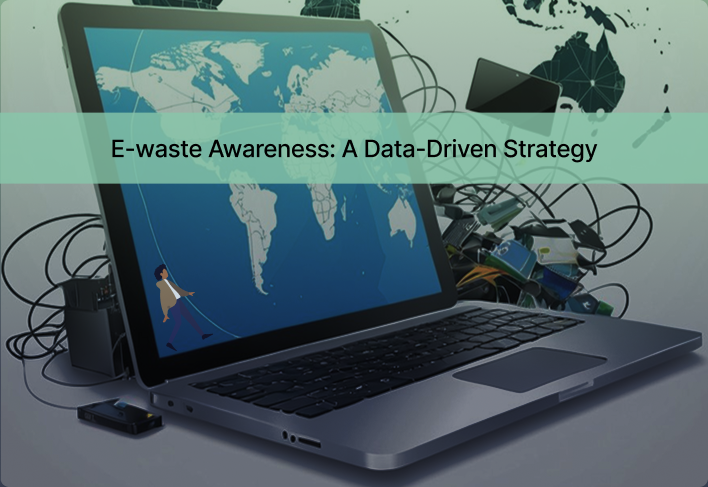
ux research & strategy | sustainable business design | product design
Data-Driven Strategy for E-Waste Awareness and Sustainable Disposal to Reduce Landfill
Role
Designer, Researcher, Strategist
Duration
15 Weeks
Project
Capstone Project
SKILLS
User research, User interviews, Business Model Canvas, Ideation Workshops, Interactive prototype
collaborators
Business Strategist
Sustainability experts
Stakeholders
the challenge
How might we empower communities to take ownership of their e-waste and become advocates for sustainable disposal practices?
The world is facing a growing e-waste crisis. In 2022, a record 62 million tonnes of electronic waste was produced, yet a staggering less than one quarter (22.3%) was properly collected and recycled.
This enormous volume of waste, projected to rise another 32% by 2030, represents a massive loss of valuable resources, as billions of dollars worth of rare earth elements and other strategic materials are discarded. The linear “take-make-dispose” model of consumption has resulted in a critical knowledge and action gap, leading to improper disposal and a squandering of valuable resources.
This project addresses this problem by developing design strategies to shift public behavior, raise awareness, and promote a circular economy through responsible recycling.
the strategy
Bridging gaps in knowledge and accessibility to build a culture of responsible e-waste management and sustainable action.
The core of this solution is a strategy that empowers individuals and communities to make informed choices about the use and disposal of electronic waste, combining knowledge, convenience, and motivation to drive sustainable behavior.
✦ Key Features
Providing a convenient, user-friendly interface – That maps nearby, certified e-waste recycling centers, making it simple for people to find safe and sustainable disposal options.
Motivating behavioral change – Transforming e-waste from a burden into a valuable resource, this solution uses educational content and incentives to encourage a shift toward a circular economy.
Educating users – on the staggering environmental and health impacts of e-waste, with a focus on the record 62 million tonnes produced in 2022 and its low recycling rate.
overview
What we learned ?
Limited community awareness, insufficient recycling infrastructure, and lack of engagement contribute to the growing crisis.
This project present the strategy to bridge the gap between consumers and sustainable e-waste solutions. By offering clear guidance and practical resources, the platform will educate communities and promote responsible recycling. Goal is to make sustainable action simple and accessible, transforming how user manage their electronics and shifting towards sustainability.
Major Issues in E-Waste Management
✦ Lack of Awareness:
A significant portion of the user is unaware of the environmental and health hazards associated with improper e-waste disposal.
✦ Inconvenient Recycling Access:
Finding and utilizing official, certified e-waste recycling centers is often difficult, leading to improper disposal in regular trash.
✦ Data Security Concerns:
Consumers fear that their personal data will not be properly erased from old devices, preventing them from recycling.
✦ Illegal Export and Unsafe Handling:
A significant portion of e-waste is illegally exported to developing nations exposes workers to severe health risks from unsafe dismantling practices.
I believe in collaboration and open communication, working closely to “Designing experiences where every vision comes alive.”
